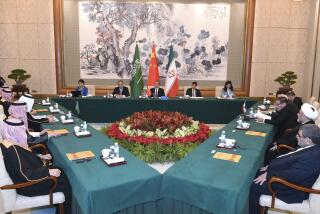The President-Elect of a Superpower : Clinton must quickly get a handle on Persian Gulf policy
- Share via
In a congratulatory call to President-elect Bill Clinton the other day, Saudi Arabia’s King Fahd expressed his concern over the re-emergence of a new strategic threat in the Persian Gulf region, this time in the form of a rapidly rearming and still ideologically aggressive Iran.
Clinton, who now sees much of the same intelligence information that President Bush gets each day, responded that he shared the king’s concern. If nothing else, this agreement emphasized one of the realities the new President must confront beginning next Jan. 20. However much he might prefer to devote most of his time and energies to the nation’s many domestic problems, Clinton will still have to deal on a daily basis with a stream of challenges to order and stability that directly affect U.S. interests and America’s friends.
Clinton is being reminded, if he had ever forgotten, that with the oath of office he becomes not just the nation’s President, but the leader of the world’s only superpower. Like it or not, global demands for his attention and for American involvement go with that responsibility.
IRAN ARISING: Saudi Arabia is by no means alone in seeing Iran as the major emerging threat to regional security. Israel, which remembers that Tehran promised the “liberation” of Jerusalem even as it fought its bitter eight-year-long war with Iraq, senses danger on several fronts: in Iran’s vehement opposition to current Arab-Israeli peace talks; in its support of radical Islamic fundamentalist forces in southern Lebanon and of militant Palestinian factions; most of all in the nuclear weapons program it seems to be vigorously pursuing.
To no small extent recent history is repeating itself. Iraq, through direct deals with willing arms suppliers but also by following an elaborate policy of deception, was able through the 1980s to acquire enormous stocks of conventional arms as well as at least the beginnings of a capability to make its own chemical and nuclear weapons. The worst consequences of that policy were avoided when Saddam Hussein, maneuvering to become master of the Persian Gulf and arbiter of oil prices and production levels, miscalculated. With his invasion of Kuwait and with the armed response it soon provoked, Hussein invited the destruction of much of his arsenal, a process that still goes on under the eyes of U.N. inspectors.
But while Iraq remains under an arms embargo Iran most clearly does not. Since the end of its war with Iraq four years ago it has been rebuilding its badly damaged economy as well as its military prowess, acquiring weapons--including three submarines from Russia--at a steady pace. No less worryingly it has also, like Iraq before it, been buying large quantities of dual-use technology, equipment that has military as well as civilian applications.
POWER OF PROFITS: Bush Administration officials say that Iran is bent on developing nuclear and germ weapons, along with ballistic missile delivery systems. Most countries within range of such missiles have cause to be concerned. Washington has already begun lobbying exporting countries to curb sales of dual-use technology and advanced weapons to the Tehran regime. The problem, again, as the Iraq experience showed, is that when it comes to military and high-tech sales, a common interest in preserving stability and peace too often takes a back seat to the lure of profits.
The Bush Administration in recent days has bluntly described Iran as a potential danger to the “peace and security” of the region. And a danger to the region is a danger to U.S. interests, whether measured by the security of oil supplies or the independence and safety of American friends. There is probably still time to get international cooperation to control military sales to Iran. But with this problem as with others, the new Clinton Administration may well find that it must move fast.
More to Read
Get the L.A. Times Politics newsletter
Deeply reported insights into legislation, politics and policy from Sacramento, Washington and beyond. In your inbox twice per week.
You may occasionally receive promotional content from the Los Angeles Times.










